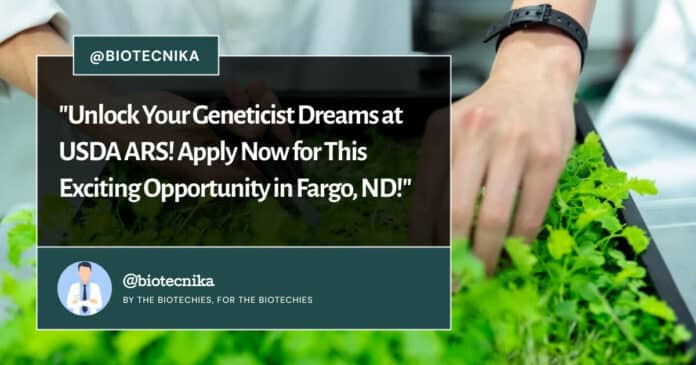US Department of Agriculture Hiring Geneticist
US Department of Agriculture Hiring Geneticist for Agricultural Research Service (ARS). Interested Candidates can check out the details below and Apply Online.
About the Company
The US Department of Agriculture (USDA) Agricultural Research Service (ARS) is committed to finding solutions to agricultural problems that impact Americans every day, from field to table. With a focus on research and innovation, ARS is dedicated to improving the quality and productivity of our nation’s agricultural systems.
Job Position: Geneticist
Location: Fargo, ND
About the job
In this position, you will be part of the Agricultural Research Service (ARS), Field Organization, Plains Area (PA), Edward T. Schafer Agricultural Research Center, Cereal Crops Research Unit located in Fargo, ND. As a Geneticist, you will work closely with the Research Leader of the Cereal Crops Research Unit and contribute to the research team’s efforts in small grains molecular genetics, plant molecular biology, and genomics research.
Duties
- Collecting and organizing experimental data
- Performing experiments related to plant genetics
- Enforcing safe laboratory practices
- Training others on laboratory methods, procedures, or equipment
- Preparing data for scientific reports or manuscripts
- Collecting and evaluating samples related to plant genetics
Requirements
Qualifications
Applicants must meet all qualifications and eligibility requirements by the closing date of the announcement including specialized experience and/or education, as defined below.
Basic Requirements:
Degree: Genetics; or one of the basic biological sciences that included at least 9 semester hours in genetics.
Graduate Education: Genetics, or a curriculum or pattern of training that placed major emphasis on genetics.
Evaluation of Education: Most students in the field take graduate work because specific training in genetics may be limited at the undergraduate level. Under these circumstances, it may be necessary to evaluate undergraduate coursework in genetics in one of two ways, as described below, to determine whether or not it is qualifying.
Courses dealing with genetics, some phase of genetics, or specific techniques that are applied in genetics work are acceptable. This includes courses in genetics, plant or animal genetics, molecular and cellular biology, mathematics and statistics (as they apply to genetics), population dynamics, and certain techniques such as those dealing with irradiation. Course work consisting of an appropriate combination of basic courses in genetics and cytology or statistics are also acceptable.
In addition to the basic requirements above, all applicants must also meet the following minimum qualification requirements:
Specialized Experience: One year of specialized experience comparable to GS-07 which is directly related to the work of this position. Specialized experience must include experience collecting, organizing, or recording experimental data; performing experiments related to plant genetics; and enforcing safe laboratory practices. OR Education: Successful completion of 2 years of progressively higher level graduate education leading to a master’s degree or master’s or equivalent graduate degree if related. Related degrees include graduate study in agronomy, horticulture, animal, dairy, or poultry husbandry, entomology, microbiology, plant pathology, chemistry, molecular and cellular biology, genetics, or physiology. OR A combination of education and experience as described above.
Specialized Experience: One year of specialized experience comparable to GS-09 which is directly related to the work of this position. Specialized experience must include experience performing plant genetic research in a laboratory environment; training others on the methods, procedures, or equipment used in the laboratory; preparing data for scientific reports or manuscripts; and collecting and evaluating samples related to plant genetics. OR Education: Successful completion of 3 years of progressively higher level graduate education leading to a Ph.D. degree or Ph.D. or equivalent doctoral degree if related. Related degrees include study in agronomy, horticulture, animal, dairy, or poultry husbandry, entomology, microbiology, plant pathology, chemistry, molecular and cellular biology, genetics, or physiology. OR A combination of education and experience as described above.
Note: Experience refers to paid and unpaid experience, including volunteer work.



